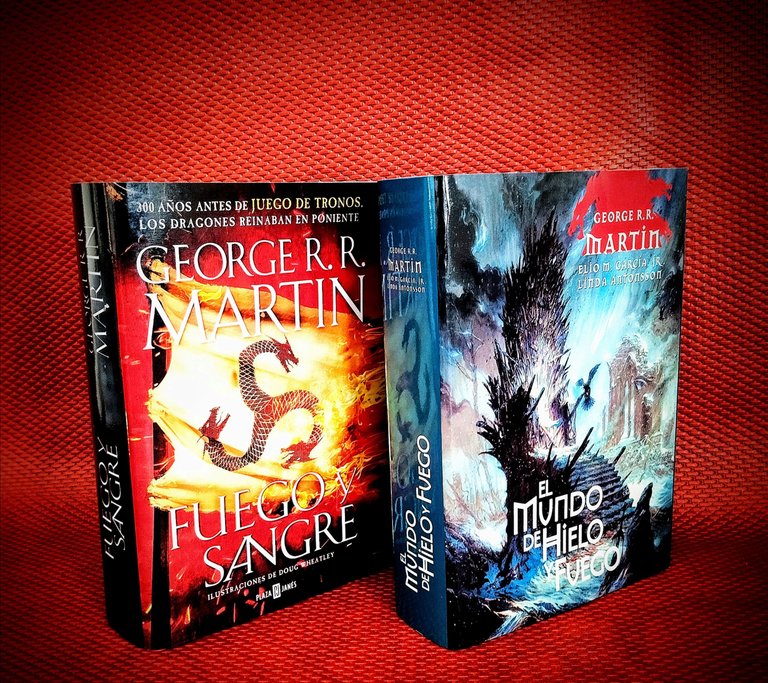The science behind the fantasy (ENG-SPA)

Over the past year, I've been reading quite a bit of fantasy. Since I discovered Brandon Sanderson with his first novel, "The Final Empire," I haven't been able to stop. It's been love at first sight, or at first reading, so to speak. And after a few books (at least 20), I've stopped to reflect, and the first thing I asked myself, clearly, is: How come I hadn't read this genre before? Why is it so addictive? What is so special about these worlds that makes the immersion in reading and the disconnection from reality so pleasurable? Or is this just me? Has it ever happened to you? I'm not the only one, right?
Well, I started researching, and let me tell you that, according to science, reading fantasy literature is not only an enjoyable and fun escape from reality, but it also has benefits for your brain. There's scientific evidence about the benefits of reading fantasy, and I want to analyze some of them, so read to the end. Because by the time you finish reading this post, if someone tells you that reading about dragons, magic, and imaginary worlds is a waste of time, you'll be able to refute them with solid arguments to defend your passion.
‼️Let's analyze the evidence‼️
1. Stimulates creativity and imagination
Fantasy literature is like a gym for the brain. When we read about magical worlds and extraordinary creatures, our minds have to work twice as hard to visualize scenarios that don't exist in reality. This activates our imagination and helps us think outside the box.
A study published in the journal Creativity Research Journal (Djikic, Oatley & Moldoveanu, 2013) found that people who read fiction, especially genres like fantasy, show a significant increase in their creative ability. This is because fantasy forces us to accept rules that are different from those of the real world, which encourages divergent thinking.
2. Improves empathy and emotional understanding
Only true readers know what it's like to mourn the death of a character, feel the pain of a loss, or be moved by an epic event or phrase. Fantasy literature, like other forms of fiction, allows us to experience things through the eyes of characters. This is not only exciting but also helps us develop empathy, allowing us to put ourselves in another person's shoes to understand their situation.
According to research published in the journal Science (Kidd & Castano, 2013), reading literary fiction improves the ability to understand the emotions and thoughts of others. In fantasy, this is even more powerful, as characters often face complex moral dilemmas and extreme situations. By identifying with them, we learn to see the world from different perspectives.
3. Reduces stress and improves mental well-being
Life can be stressful: work, studies, responsibilities... What better way to unwind than to lose yourself in a fictional world?
A study from the University of Sussex (Lewis, 2009) found that reading for just six minutes can reduce stress levels up to 68% more effectively than tea or music. This illustrates the importance of integrating reading as a stress-reduction strategy into your daily routine. Immersing yourself in a book lowers cortisol levels and promotes relaxation. This calms the mind and reduces the physical symptoms of stress, such as muscle stiffness and palpitations. And fantasy, with its ability to transport you to other worlds, is especially effective for this.
4. It fosters resilience and problem-solving
Characters in fantasy literature often face seemingly impossible challenges. These stories teach us that, with determination and creativity, obstacles can be overcome.
This is not only inspiring, but it can also influence how we deal with our own problems. A study published in Psychology of Aesthetics, Creativity, and the Arts (Green, 2016) suggests that people who read fantasy fiction tend to be more resilient and seek innovative solutions in difficult situations.
5. Expand your vocabulary and improve your language skills
Fantasy literature is often filled with detailed descriptions, rich dialogue, and words we don't use in everyday life. This not only makes reading richer but also helps expand your vocabulary and improve your reading comprehension.
A study from the University of Liverpool (Bal & Veltkamp, 2013) found that reading fiction, especially genres like fantasy, improves language skills and the ability to understand complex texts. Additionally, by being exposed to different writing styles, you learn to express yourself more effectively.
6. Strengthens social connections
Although reading is a solitary activity, fantasy literature has a unique way of bringing people together. How many times have you talked with friends about your favorite "Game of Thrones" theory (since Martin can't bring himself to finish it, we have to imagine our own ending) or argued about the ending of "The Lord of the Rings"—who was more important, Frodo or Sam? These books create communities of fans who share interests and passions. Plus, fantasy often addresses universal themes like love, friendship, sacrifice, and the struggle between good and evil. This allows us to connect with others on a deeper level, even if their experiences are very different from our own.
So you know, reading fantasy literature isn't just a hobby; it's a way to enrich your mind, your emotions, and your relationships. From enhancing your creativity and empathy to reducing stress and strengthening your resilience, the benefits are as real as the excitement you feel when you open a book and immerse yourself in its story.
So, the next time someone tells you that fantasy is "just for kids," remind them that science is on your side. And if you haven't tried this genre yet, what are you waiting for?
If you want a recommendation from me, here are two great ones to start with.
And here I share some images of my most recent readings.



English is not my native language, this translation was made with Google translate, I apologize.
Versión en español
En el último año he estado leyendo bastante fantasía. Desde que descubrí a Brandon Sanderson con la primera novela que leí de él: "El imperio Final", no he podido parar con este género. Ha sido amor a primera vista, o a primera lectura podríamos decir. Y después de unos cuantos libros (al menos 20) me he parado un poco a reflexionar, y lo primero que me pregunté, claramente es ¿Cómo es que no había leído este género antes? ¿Por qué es tan adictivo? ¿Qué tienen de especial esos mundos que hacen que la inmersión en la lectura y la desconexión de la realidad sean tan placenteras? O es que esto solo me pasa a mí. ¿Te ha pasado alguna vez? ¿No soy el único verdad?
Pues me puse a investigar y déjame decirte que, según la ciencia, leer literatura fantástica no solo es un escape de la realidad ameno y divertido, sino que además tiene beneficios para tu cerebro. Existe evidencia científica sobre los beneficios de leer Fantasía y quiero analizar algunos, así que lee hasta el final. Porque cuando termines de leer este post si alguien te dice que leer sobre dragones, magia y mundos imaginarios es una pérdida de tiempo, podrás refutarle con argumentos sólidos para defender tu pasión.
‼️Analicemos la evidencia‼️
1. Estimula la creatividad y la imaginación
La literatura fantástica es como un gimnasio para el cerebro. Cuando leemos sobre mundos mágicos y criaturas extraordinarias, nuestra mente tiene que trabajar el doble para visualizar escenarios que no existen en la realidad. Esto activa la imaginación y nos ayuda a pensar fuera de la caja.
Un estudio publicado en la revista (Creativity Research Journal Djikic, Oatley & Moldoveanu,2013) encontró que las personas que leen ficción, especialmente géneros como la fantasía, muestran un aumento significativo en su capacidad creativa. Esto se debe a que la fantasía nos obliga a aceptar reglas diferentes a las del mundo real, lo que fomenta el pensamiento divergente.
2. Mejora la empatía y la comprensión emocional
Solo los verdaderos lectores sabemos lo que es llorar la muerte de un personaje, sentir el dolor de una perdida, emocionarnos por algún suceso o frase épica. La literatura fantástica, al igual que otras formas de ficción, nos permite vivir experiencias a través de los ojos de los personajes. Esto además de emocionante, nos ayuda a desarrollar empatía, a ponernos en los zapatos de otra persona para entender su situación.
Según una investigación publicada en la revista Science (Kidd & Castano, 2013), leer ficción literaria mejora la capacidad de entender las emociones y pensamientos de los demás. En la fantasía, esto es aún más poderoso, ya que los personajes suelen enfrentarse a dilemas morales complejos y situaciones extremas. Al identificarnos con ellos, aprendemos a ver el mundo desde perspectivas diferentes.
3. Reduce el estrés y mejora el bienestar mental
La vida puede ser estresante: trabajo, estudios, responsabilidades... ¿Qué mejor manera de desconectar que perderse en un mundo ficticio?
Un estudio de la Universidad de Sussex (Lewis, 2009) descubrió que leer durante solo seis minutos puede reducir los niveles de estrés hasta en un 68% más eficazmente que el té o la música. Esto ilustra la importancia de integrar la lectura como estrategia para reducir el estrés en la rutina diaria. Sumergirse en un libro reduce los niveles de cortisol y promueve la relajación. Esto calma la mente y reduce los síntomas físicos del estrés, como la rigidez muscular y la palpitación. Y la fantasía, con su capacidad para transportarte a otros mundos, es especialmente efectiva para esto.
4. Fomenta la resiliencia y la resolución de problemas
Los personajes de la literatura fantástica suelen enfrentarse a desafíos aparentemente imposibles. Estas historias nos enseñan que, con determinación y creatividad, se pueden superar los obstáculos.
Esto no solo es inspirador, sino que también puede influir en cómo enfrentamos nuestros propios problemas. Un estudio publicado en Psychology of Aesthetics, Creativity, and the Arts (Green, 2016) sugiere que las personas que leen ficción fantástica tienden a ser más resilientes y a buscar soluciones innovadoras en situaciones difíciles.
5. Amplía tu vocabulario y mejora tus habilidades lingüísticas
La literatura fantástica suele estar llena de descripciones detalladas, diálogos elaborados y palabras que no usamos en la vida cotidiana. Esto no solo hace que la lectura sea más rica, sino que también ayuda a expandir tu vocabulario y mejorar tu comprensión lectora.
Un estudio de la Universidad de Liverpool (Bal & Veltkamp, 2013) encontró que leer ficción, especialmente géneros como la fantasía, mejora las habilidades lingüísticas y la capacidad de entender textos complejos. Además, al estar expuesto a diferentes estilos de escritura, aprendes a expresarte de manera más efectiva.
6. Fortalece las conexiones sociales
Aunque leer es una actividad solitaria, la literatura fantástica tiene una forma única de unir a las personas. ¿Cuántas veces has hablado con amigos sobre tu teoría favorita de "Juego de Tronos" (ya que Martin no se decide a terminarla, tenemos que imaginarnos nosotros nuestro final) o has discutido sobre el final de "El Señor de los Anillos", quien fue mas importante, Frodo o Sam? Estos libros crean comunidades de fans que comparten intereses y pasiones. Además, la fantasía suele abordar temas universales como el amor, la amistad, el sacrificio y la lucha entre el bien y el mal. Esto nos permite conectar con otros a un nivel más profundo, incluso si sus experiencias son muy diferentes a las nuestras.
Así que ya sabes, Leer literatura fantástica no es solo un pasatiempo; es una forma de enriquecer tu mente, tus emociones y tus relaciones. Desde mejorar tu creatividad y empatía hasta reducir el estrés y fortalecer tu resiliencia, los beneficios son tan reales como la emoción que sientes cuando abres un libro y te sumerges su historia.
Así que, la próxima vez que alguien te diga que la fantasía es "solo para niños", recuérdales que la ciencia está de tu lado. Y si aún no has probado este género, ¿Qué estás esperando?
Si quieres una recomendación de mi parte, acá te dejo dos muy buenas para comenzar